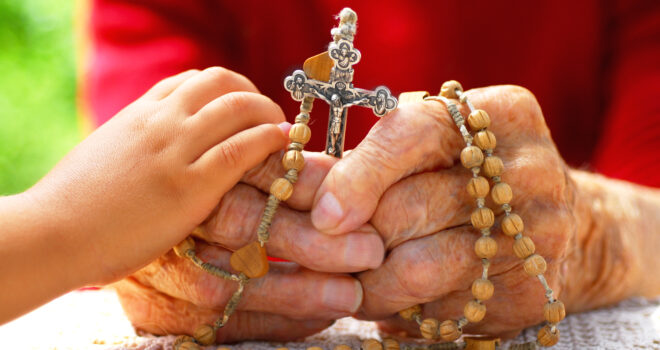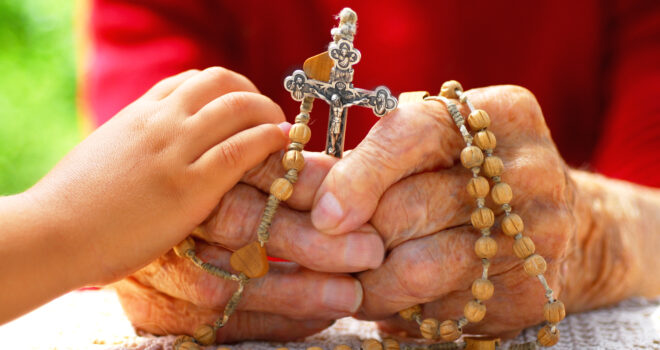The recently published book Sacramentals: Their Meaning and Spiritual Use (Manchester, New Hampshire: Sophia Institute Press, 2023) explains that sacramentals are powerful sacred signs and an indispensable means of grace. Through them, the liberation from evil and the healing of sicknesses (including psychological disorders) can occur. Sacramentals can bring conversion and they can help the believer to overcome the multiple difficulties of life and provide a manifold help on the way to God. But how do they work and what do we have to do to obtain these graces?
Questions such as these are very timely, especially for Christians, because sacramentals have found a renewed popularity. Is it enough to wear a miraculous medal, hang a rosary from your car mirror, or light a blessed candle at home to be protected and to be under God’s grace? What do we have to take into consideration in order for sacramentals to unfold their grace? One thing must be established from the outset: sacramentals are neither about magic nor about superstition or anything similar. This becomes obvious when it is understood how sacramentals work.
Sacramentals work different than sacraments. It is important to always recall that the seven sacraments are instituted by Jesus Christ and, consequently are of divine right. They work by themselves because Christ works in them and through them.
Sacramentals, on the other hand, are instituted by the Church, and their mode of action is different. Spiritual effects are obtained “from the work of the doer.” That means they are dependent upon the holiness of the one who administers and the one who receives them. While it is true that the intercessory power of the Church is also at work in them, the effectiveness of sacramentals depends primarily on the moral condition of the person who administers as well as the person who receives them. This becomes clearly evident in the lives of the saints. When they administered sacramentals—like St. Francis, St. Clare, St. Benedict and countless others—they had great impact. Sick people were healed, miracles happened, etc.
At first glance, it may not seem convincing that the condition of the individual receiving or administrating the sacramental matters deeply. It appears much like the heretical “Donatism” opposed by Saint Augustine. According to this heretical current, only saintly priests can validly administer sacraments producing spiritual effects. Concerning the sacraments, such a position would be entirely false, because in fact, they work by themselves since Christ works through them.
However, it is quite different in the case of the sacramentals, as the following example shows. If an exorcist were to perform an exorcism while not being in the state of grace, that is, separated from God by a grave sin, he would not be able to accomplish anything. Worse, his action—exorcisms are sacramentals—would be negligent and dangerous. He would not only endanger himself but also those who ask him for deliverance.
As this example shows, the effectiveness of sacramentals depends primarily on the moral condition of the person administering them. The same can be said with regard to the one who receives sacramentals. If the person is not in communion with God, unless a miracle happens, no spiritual effects will be gained. Conversely, if a person is well disposed and prepared to receive divine grace, participating with faith and confidence in the administration or reception of the sacramentals, can yield many graces. Therefore, whoever wants to receive grace and spiritual effect by using sacramentals must live a truly Christian life.
At this point, it becomes clear how important it is to explain this to the faithful in catechesis. The above-mentioned book on sacramentals serves this purpose. A good understanding of how sacramentals work helps to encourage Christians to refocus their lives on Christ in order to share in those graces that God wants to give us. In other words, any formation on sacramentals offers great opportunities for catechesis and the renewal of the Christian life.
With all this in mind, it is clear how sacramentals work and why they are not superstition or magic. When used with faith, which presupposes communion with God, they become powerful means of grace. Wearing the miraculous medal will then protect the person through the presence of the Blessed Virgin Mary, the Mother of God, who will bestow abundant graces through this sacramental. Something similar can be said concerning the rosary put behind the mirror in a car or whoever lights a blessed candle.
A basic knowledge of the meaning and spiritual use of sacramentals will change the life of the faithful. It opens their view toward the supernatural. Heaven is open and our merciful God wants to grant us numerous graces. He is the source of all graces, and he makes his promise — that he will not leave us orphaned (cf. John 10:18) — true also through the sacramentals. This is a very consoling thought not only in hardship but also for daily life. However, it presupposes that the faithful live in deep communion with Him. That is how the sacramentals work and that is why your participation matters.













